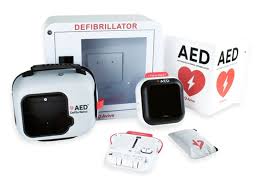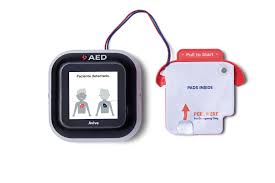
Automatic External Defibrillators (AED)
Boston College has implemented a comprehensive public access Automated External Defibrillator (AED) program across all our campuses and properties. The Avive AEDs found on campus are designed for anyone to use without any specific training, but we encourage all members of the BC community to learn about how to use an AED and become trained.
An automated external defibrillator (AED) is a portable medical device that is designed to analyze heart rhythm and if necessary, deliver an electrical shock to restore the heart to a normal rhythm after sudden cardiac arrest.
The public access AEDs are housed in cabinets in key locations as shown on the map below. The cabinets include small rescue kits with face shields and other supplies needed to assist in the use of the AEDs as well as bleeding control kits that can be used to help control life-threatening bleeding during an emergency.
During all medical emergencies, call Boston College Police at 617-552-4444 or 911. AEDs are also carried in BC Police vehicles, by BC Emergency Medical Services (EMS), Campus Recreation, athletic trainers, and are located at Health Services.

Avive AED on campus
FAQs
Sudden cardiac arrest (SCA) is one of the leading causes of death in the United States. Sudden cardiac arrest cases are usually due to abnormal heart rhythms called arrhythmias, the vast majority of which are ventricular fibrillation. Ventricular fibrillation isa condition in which the heart's electrical impulses suddenly become chaotic; causing the heart’s pumping action to stop abruptly. Victims collapse and quickly lose consciousness, often without warning. Unless a normal heart rhythm is restored, death follows within a matter of minutes. SCA can strike anyone, at any time, anywhere.
Sudden cardiac arrest (SCA) is an electrical problem in the heart. SCA can present with or without signs or symptoms. A heart attack is a circulation problem that occurs when blood flow to the heart is blocked. A heart attack may result in the death of muscle tissue due to a loss of blood supply. A heart attack will oftentimes present with signs or symptoms. Both of these are considered to be cardiac emergencies, and it is important to seek medical attention immediately! If you believe someone is in sudden cardiac arrest or experiencing a heart attack, call BC Police at 617-552-4444 or 911.
A series of four critical steps, called the "Cardiac Chain of Survival," have been identified for the treatment of SCA:
- Recognizing a emergency exists and initiating Early access to care (i.e., calling 911 or another emergency number such as BC Police)
- Providing immediate patient care through early cardiopulmonary resuscitation (CPR)
- Initiating early defibrillation through use of a nearby AED
- Early institution of advanced cardiac life support (EMS and hospital care).
A break in any of the four links in the chain can compromise the victim's chance for survival. However, early defibrillation is recognized as the most critical step in restoring cardiac rhythm and resuscitating a victim of SCA.
Defibrillation is the treatment of irregular, sporadic or absent heart rhythms by an electrical current to the heart. Defibrillation administered within four minutes after collapse is most successful. Every minute a victim is unconscious translates to approximately a ten percent decrease in the likelihood of survival. After ten minutes, very few resuscitation attempts are successful. Thus, the most important element in the treatment of SCA is providing rapid defibrillation therapy. CPR may help prolong the window of survival, but it cannot reverse SCA.
AEDs are extremely easy to use. We encourage everyone to get trained in how to perform CPR and use an AED. However, anyone can provide voluntary assistance to victims of medical emergencies. Massachusetts’s “Good Samaritan” law specifically protects from liability any individual who volunteers to help someone in a medical emergency, as long as the actions are in good faith and not compensated. The Avive AEDs deployed across campus are very easy to use and will walk you through how to deploy the AED in an emergency using voice and video instructions.
No. AEDs are designed to allow the operator to deliver a shock only when the device has detected the presence of a life-threatening arrhythmia. The Avive AEDs located at Boston College are automatic AEDs, meaning that if it detects a life-threatening arrhythmia, it will inform the rescuers to not touch the patient and will deliver a shock to the patient. Once the shock is delivered, it will inform the rescuers to resume CPR. If it does not detect a shockable rhythm, it will instruct the rescuer to perform chest compressions as needed.
Generally, the victim should not be in a puddle or pool of water, nor should the rescuer be kneeling in a puddle of water when operating an AED. AEDs can be used in a variety of environments including rain and snow. Always use common sense when using an AED and follow the manufacturer’s recommendations and training you have been provided.
Everyone is encouraged to be trained in providing CPR and in the use of an AED. Boston College Emergency Medical Services (BC EMS) offers CPR classes. The Red Cross offers many classes, including online trainings in first aid, CPR, and AED use.
Contact the BC Office of Emergency Management if you are interested in scheduling a class for a group of people and/or want instructions about how to perform CPR, use an AED and other lifesaving skills.
For any further questions or information, please contact the Office of Emergency Management, at 617-552-4316 or by email at bc_emergency@bc.edu.
For emergencies, contact Boston College Police at 617-552-4444 or 911.

